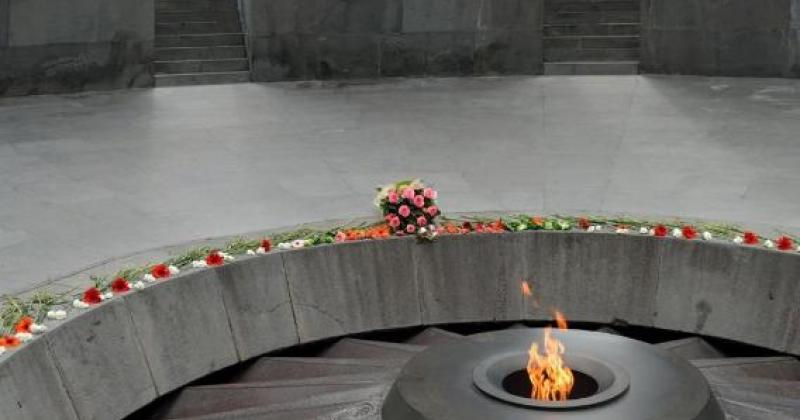On the eve of the commemoration of the Armenian people martyrdom at the beginning of the twentieth century, the ambassador to the Holy See Mikayel Minasyan recalls Francis's journey and its significance for the future
Pope Francis’ journey to Armenia in June 2016 is one of the few he had heartfully decided right in the first few weeks of his pontificate, just as the first controversy were emerging on what had happened at the beginning of the twentieth century in Armenia. On June 3 2013, Pope Bergoglio had in fact received the Armenian Patriarch of Cilicia, Nerses Bedros XIX. One of the members of the entourage had caught on camera the Pontiff who, as he was greetings a person, explicitly spoke of "genocide". The video was immediately posted on Youtube. Those words were not pronounced during a public meeting but privately as the Pope was trying to comfort the descendants of the victims of those massacres. The Turkish Foreign Ministry immediately expressed his disappointment both to the Holy See's embassy in Ankara and directly to the Vatican. Four days later, on June 7, the first resident Ambassador of the Republic of Armenia to the Holy See, Mikayel Minasyan, who had initially tried to calm things down, handed his credentials over to the Pope. Today, after the commemoration in Saint Peter in 2015 and after the papal journey to Armenia, this controversial debate is just a faded memory. Vatican Insider asked Ambassador Minasyan what has Pope Francis’ visit represented.
April 24 marks the commemoration of the martyrs of the Armenian genocide. What is the meaning of the Pope's visit to the "Great Evil”, the Yerevan Memorial dedicated to Metz Yeghérn's victims?
"It has been an emotional and highly symbolic visit, which has perfectly expressed, in my opinion, the importance of some key values of Pope Francis's pontificate, such as solidarity, openness and freedom. Solidarity with the Armenian people, a people who have suffered tremendously and the Pope teaches that we must be united with those who suffer. Opening, because it gave Armenians the courage to open to the world, to break through that shell of pain still fueled by the Turkish government’s negations, and ultimately of freedom, of the Pope's personal freedom, who defied pressure to express the other two values. I recall the President of the Republic’s words at the end of that ceremony that perhaps best describes the meaning of Francis’ visit to the "Rondini Fortress "Your Holiness - He told Him - today you have soothed our wounds.”
It has struck many the fact that Francis has chosen, during the visit to the memorial, to remain silent, and not deliver any speech. This happened also in Auschwitz the following month. What does this silence mean?
"I believe that in the face of certain tragedies that have struck humanity, there is no instrument other than silence as an invitation to listen. To listen to what the victims have to say, and not to speak in their place, to pray for them and pray so that what has happened to them does not happen to humanity. Even at the opening of the Mass on April 12, 2015, during the commemoration of the centenary, Pope Francis had indicated in these early-twentieth century tragedies, the root of what happened later and of what is unfortunately happening today. Armenia felt the Pope's embrace to Christians in the Middle East, for whom the Pope, never tires of invoking peace, since silence can not be applied to tragedies that are consumed before our eyes, always keeping in mind the values that accompanied Pope Francis to the memorial of the Armenian genocide."
Christian martyrdom is not something that belongs to the past: we have seen it in Egypt’s dramatic Easter. Can the past help us face the present and the future?
"This is what we Armenians believe in, and for which we have been tirelessly struggling for over a century. If then, one hundred years ago, the tragedy that struck my people was given the right judgment, as nations are doing belatedly in recent decades, we would probably have had a different situation for Christians in the Middle East today. From Turkey we expect this step along with the awareness that cultural and political plurality, in the past, has been Turkey’s source of great wealth. Unfortunately, however, this common memory is constantly denied, covered up, forgotten."
During the journey to Armenia, the Pope spoke of memory not as a cause for divisions and conflict: in your view, is there a chance to make some steps forward in a shared acknowledgement with Turkey?
"It seems to me that the Pope is very fond of the theme of memory. He has spoken on several occasions but always as something profoundly positive because it creates links between humans, among peoples, even when they are difficult to accept. I think that with what he expressed in St. Peter on the centenary of the Armenian genocide, and then reiterated during his trip to Armenia the following year, he wanted to make this memory the treasure on which to build peaceful relations between Armenians and Turks, the path of reconciliation, with the awareness, however, that to break down walls one must start from the truth."
